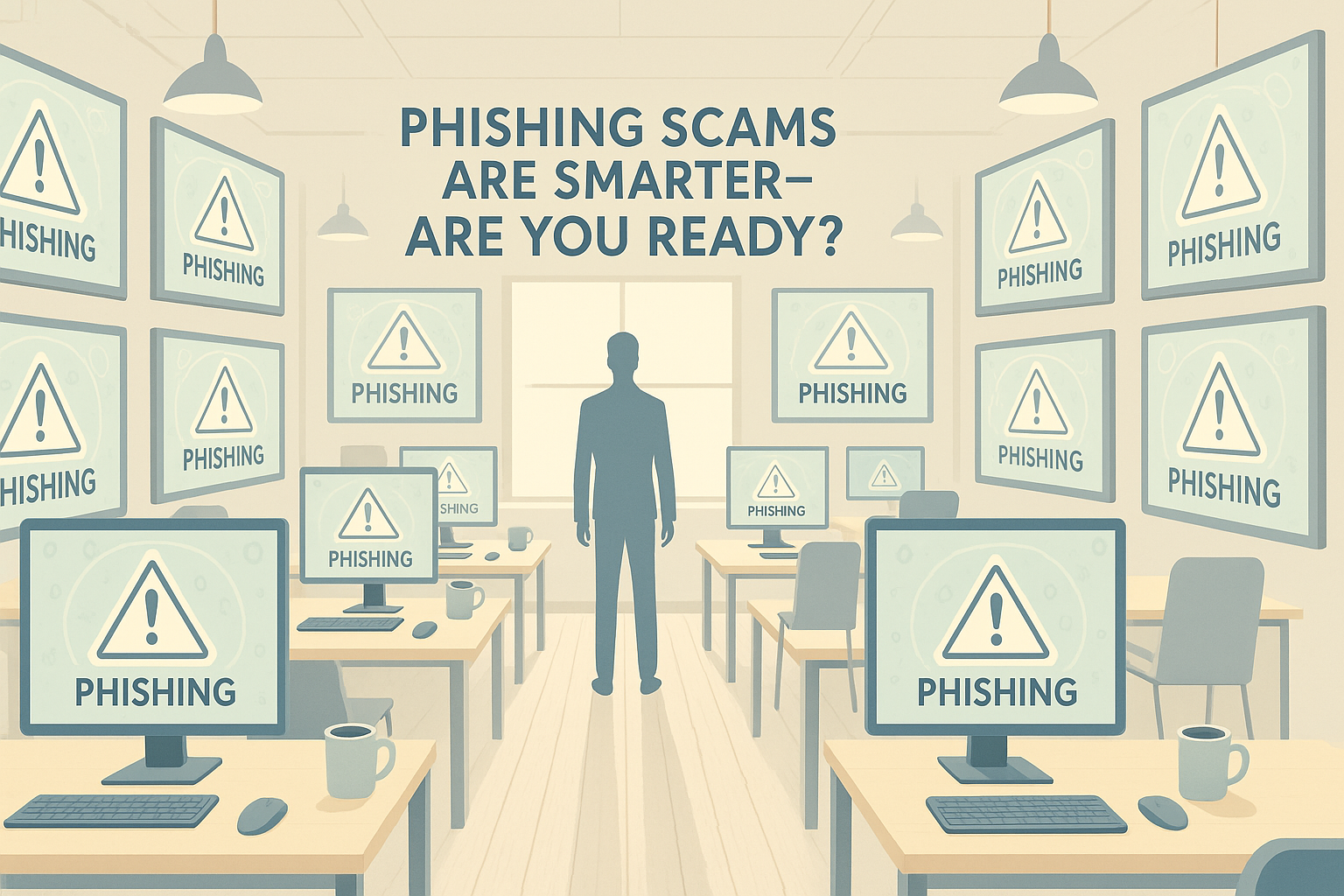What is Phishing?
Have you ever gotten a strange message from someone asking for your password or trying to scare you into clicking a weird link? That might be a phishing scam.
Phishing is when bad people try to trick you into giving them your info, like your passwords, bank details, or email address. They might send fake emails or texts that look real, hoping you’ll fall for the trap.
What Does a Phishing Scam Look Like?
It could be:
- An email that looks like it’s from your school or a game you play
- A text that says you won a prize
- A pop-up that says your phone has a virus
They often look real, but they’re fake.
Why Do People Fall for Phishing?
Scammers are good at pretending. Scammers create messages that look real, use scary words like “Your account will be closed,” or tell you to act fast. When people panic, they make quick choices—like clicking without thinking.
How Phishing Has Changed Over Time
Phishing scams used to be easy to spot. Long ago, scammers used lots of spelling mistakes and silly stories. Today? Not so much.
They’re sharper, trickier, and way more believable.
Old Tricks vs. New Tactics
- Old Tricks: “You’ve won a million dollars!”
- New Tactics: “Your bank account has a problem—click here to fix it.”
Scammers now copy real websites, use logos, and even pretend to be your friends.
Real Stories of People Getting Tricked
- A kid clicked on a link thinking it was from their teacher—boom! Someone hacked their school account.
- A parent got a fake message from “Amazon,” asking them to log in. They typed in their password, and the scammers got in.
It happens all the time. But you can stay safe with the right knowledge.
Types of Phishing Scams Today
Email Phishing
You get an email from what looks like your bank or school. It says there’s a problem and tells you to click a link. That link? Fake.
Text Message Phishing (Smishing)
A text might instruct you, “Click here to see that your package is delayed.” If you click, you might go to a fake website or even download a virus.
Phone Call Phishing (Vishing)
Some scammers will call you pretending to be from tech support or a company you trust. They’ll ask for your password or remote access to your device.
Social Media Phishing
Scammers can send you messages on apps like Instagram or Discord. They might say something like, “Check out this video of you!”
Fake Websites That Look Real
Some websites look exactly like your favorite gaming site or your bank. But look closely—the web address might be a little off.
How to Spot a Phishing Scam
Strange Emails or Texts
If something feels off, it probably is. Maybe the message:
- Comes from someone you don’t know
- Has weird grammar or spelling
- Asks you to do something quickly
Urgent Language and Scary Messages
Scammers want you to panic. They use words like:
- “Act now!”
- “Your account is in danger!”
- “This is your final warning!”
Links That Look Fishy
Hover over the link (don’t click!). If it looks weird or has misspellings, don’t trust it.
Requests for Personal Information
Real companies will never ask for your password or credit card by email or text. If they do—it’s fake.
How to Protect Yourself from Phishing
Think Before You Click
Take a second. Don’t rush. Ask yourself:
- Do I know this person?
- Was I expecting this message?
- Does it sound real?
Don’t Share Personal Info Easily
Keep your:
- Passwords
- Address
- School name
- Phone number
PRIVATE. Only share them with trusted adults.
Use Strong Passwords
Use passwords that are long and hard to guess. Don’t use your name, birthday, or pet’s name. Mix up letters, numbers, and symbols.
Update Your Devices and Software
Updates help fix problems that scammers could use. Keep your phone, tablet, and computer up to date.
Ask for Help When in Doubt
If you’re not sure, ask a parent, teacher, or someone from Core Technologies Services, Inc. They can help you figure it out safely.
How Core Technologies Services, Inc. Can Help
Core Technologies Services, Inc. is here to make sure you, your school, or even your business stays safe online.
Training for Teams and Families
They teach people how to spot phishing and stay safe. It’s like a superhero class for the internet!
Security Software and Monitoring
They install software that watches out for bad links and stops scammers in their tracks.
Real-Time Support When You Need It
Something looks fishy? They’ve got your back—right away.
Why Kids and Teens Should Care Too
Online Games and Social Media Risks
Scammers know kids use games and apps. They might try to:
- Steal your game accounts
- Send messages that look like they’re from friends
Being a Cyber-Smart Student
Learn the rules of safe surfing. Help your friends. Be the reason that you stop someone else from being tricked.
What To Do If You Get Caught in a Scam
Tell an Adult or Teacher
Don’t be scared. It’s not your fault. Just tell someone right away so they can help.
Change Your Passwords
Change your password to something new and strong. This helps stop scammers from coming back.
Report the Scam
Tell your email service, game platform, or social app. The faster they know, the faster they can stop it.
FAQs About Phishing
What should I do if I clicked a bad link?
- Tell an adult right away. Don’t enter any info. They can help you fix it.
Can scammers get me through games?
- Yes. They can send fake messages or links. Always double-check before clicking.
How do I know if an email is fake?
- Look for spelling mistakes, weird links, and scary messages. If it feels off, don’t click.
Is it okay to open links from friends?
- Only if you’re expecting it and it looks safe. Even hackers can hack friends.
Can a text hack my phone?
- Yes. That’s why you should never click links from strangers.
Who can help me if I’m not sure?
- Ask your parents, teacher, or Core Technologies Services, Inc. They’ll help you stay safe.
Final Thoughts: Stay Safe Online!
Phishing scams are getting smarter, but you’re getting smarter too! You’ve learned what phishing is, how to spot it, and how to stay safe. Remember—take your time, ask questions, and never give out your info without thinking first.
With help from trusted adults and safe tech companies like Core Technologies Services, Inc., you can have fun online while staying safe.







